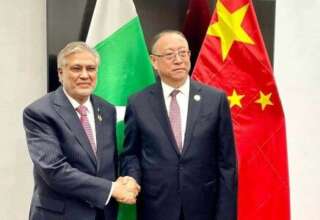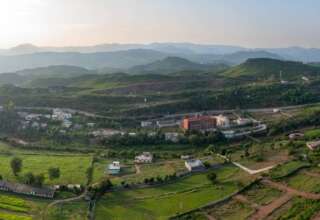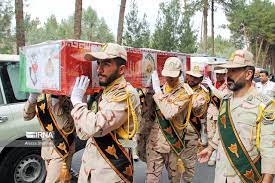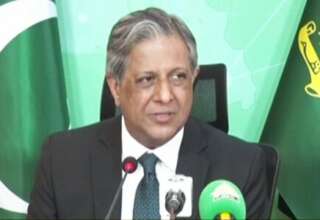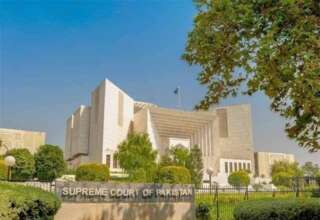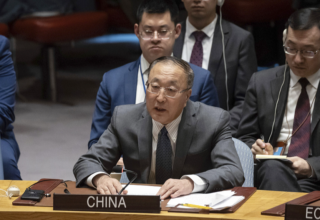
- Balochistan, KP nationalists vow to stand by Beijing Declaration
- NP leader urges adjustments in CPEC projects to facilitate Gwadar fishermen
- Political leaders call for early completion of CPEC’s western route
ISLAMABAD – In a rare support to multi-billion-dollar China, Pakistan Economic Corridor (CPEC), the senior leaders of major nationalist political parties of Balochistan and Khyber Pakhtunkhwa (KP) on Sunday announced unconditional support to the game-changing project and vowed to stand by the Beijing Declaration.
The Beijing Declaration was signed last week by the representatives of the Political Parties of China and Pakistan at the First Meeting of Joint Consultation Mechanism (JCM) at Beijing.
Previously, the nationalist leaders had expressed reservations over CPEC route and the allocation of funds and had asked the governments of both countries to declare and complete the western route as the official route of the corridor because it was the shortest route between Gwadar Port and China’s special economic zone (SEZ) in Kashgar.
Talking exclusively to Pakistan Today here at a special sitting, Balochistan Governor Amanullah Khan Yasinzai, senior leadership of National Party (NP), Balochistan Awami Party (BAP), Balochistan National Party-Mengal (BNP-M), Awami National Party (ANP), Pakhtunkhwa Milli Awami Party (PkMAP) and others vowed to stand by the consensus on CPEC in line with the spirit of recently-agreed unanimous declaration of joint consultation mechanism (JCM) between political parties of Pakistan and China.
Governor Yasinzai said that JCM was the prime example of a mechanism that political parties should follow to support national issues. Referring to the joint declaration at Beijing conclave hosted by the International Department of Communist Party of China (IDCPC), he said that Chinese minister Song Tao had assured full cooperation for the development of less developed areas of both provinces.
He said that the political consensus would aid in speeding up CPEC projects in both provinces, thus enabling the young skilled workers to benefit from new jobs. He said that there was a need to promote cooperation between the universities of Balochistan and China as it would help build a knowledge-based society in Pakistan’s largest province. He said that he was keen on the establishment of vocational training institutes in Quetta and Gwadar which would help impart modern skills and training on the local youth.
“Chinese authorities have assured us that under the next phase of CPEC, there will be a greater focus on development projects in Balochistan and KP which is good news for our youth,” he said.
NP Secretary-General Jan Mohammad Buledi said that JCM had unanimously vowed to support CPEC projects and this political consensus should now usher in the development of infrastructure and employment projects across Balochistan.
“The people of Balochistan have been ignored in the past. Now that CPEC has brought an opportunity for the people of both these provinces, we hope that the federal and provincial governments would ensure that the people benefit from CPEC,” he said. He also said that he had shared some observations over the planning of some projects in Gwadar which needed to be reviewed by the authorities of both countries.
“Gwadar Eastbay Expressway has blocked the access of local fishermen to the sea which is a problem because this is their only source of income. We have been assured that measures would be taken to address the issues facing the local inhabitants,” he said.
KP Member of Provincial Assembly (MPA) Ibrahim Khattak said that CPEC emerged as an opportunity for the people of KP who have faced terrorism for a long time.
“Terrorism harmed KP and Balochistan and destroyed the infrastructure of both provinces. CPEC, however, has breathed a fresh life to KP’s fortunes. Rashakai Special Economic Zone would soon be completed to become the first SEZ of Pakistan under CPEC and it reflects how the corridor would benefit the people,” he said. He also called for priority to be given to student exchange programme and employment opportunities for youth.
KP MPA Ahmed Khan Kundi, who is a member of the Pakistan People’s Party (PPP), said that both provinces form the western part of the country and constitute more than half of Pakistani territory. These areas had been ignored in the past and they should be given due priority in the second phase of CPEC.
PkMAP’s Zakir Khan Kasi was of the view that there is a need for transparency and accountability in CPEC projects. “There is a need for the appointment of good managers for CPEC projects so that CPEC could be protected from all controversies,” he said.
PkMAP MPA Nasrullah Baraich said that his party stands by the JCM agreement and hopes that both countries would focus on the development of Balochistan’s ignored areas.
“We need to understand that CPEC’s success is connected to peace in Afghanistan, therefore, both Pakistan and China should focus on the Afghan peace process as well,” he said.
Shagufta Malik, an ANP lawmaker from KP, said that her party is fully supporting CPEC. She also said that there was a need to shift focus on the immediate completion of CPEC’s western routes as it was the shortest link between Pakistan and China.
Jamiat Ulema-e-Islam-Fazl’s (JUI-F) Mahmood Ahmed Bhittanni said that the western districts of KP should get a lion’s share of KP’s allocation of CPEC projects as more employment in areas lying outside CPEC route would bring peace and stability.
BAP leader and younger brother of Nawab of Kalat, Prince Omar Khan stressed on the promotion of people-to-people contacts between Pakistan and China. “We will support CPEC projects with our lives, with our tribes,” he said, adding that the fruits of CPEC should also trickle down to the ignored people of Balochistan as well.
BNP-Mngal lawmaker Akbar Mengal said that CPEC should be made people-friendly and for this purpose, youth engagement should be given top priority. He said that the political parties of Balochistan unanimously supported CPEC.
Faisal Hayat Khan was of the view that CPEC was a mutually beneficial project for both Pakistan and China and it can constitute a win-win collaboration between the two nations.
Bilal Durrani said that people to people contacts between the two states was need of the hour and hence youth should be given more opportunities under the people exchange program.
Senior journalist Javed Afridi said that there was a dire need to start CPEC projects in tribal areas where unemployed youth could be provided more opportunities.
Mohammad Khaliq Khan was of the view that CPEC was need of hour and its projects should target neglected areas of KP where terrorism had wreaked havoc.
Ali Qaisar urged promotion of entrepreneurship under the CPEC initiative so as younger generation could reap the fruits of CPEC. He urged China and Pakistan to introduce business-friendly visa regimes between the two sister countries so as the young entrepreneurs could reap dividends of the CPEC.


